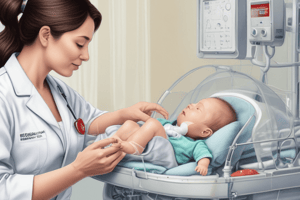Podcast
Questions and Answers
What is a potential consequence of untreated hypoglycemia in neonates?
What is a potential consequence of untreated hypoglycemia in neonates?
- Osmotic diuresis
- Dehydration
- Electrolyte imbalance
- Neurodevelopmental impairment (correct)
What is the suggested strategy to prevent hyperglycemia in neonates receiving PN?
What is the suggested strategy to prevent hyperglycemia in neonates receiving PN?
- Adding fat emulsion to the PN infusion
- Increasing dextrose delivery
- Avoiding excess energy delivery (correct)
- Early insulin therapy
What is the serum glucose concentration above which hyperglycemia is defined in VLBW infants?
What is the serum glucose concentration above which hyperglycemia is defined in VLBW infants?
- 125 mg/dL
- 180 mg/dL
- 150 mg/dL (correct)
- 200 mg/dL
What is the reported incidence of hyperglycemia in VLBW infants during the first week of life?
What is the reported incidence of hyperglycemia in VLBW infants during the first week of life?
What is the consequence of severe hyperglycemia in neonates?
What is the consequence of severe hyperglycemia in neonates?
What is the recommended approach to hyperglycemia prevention in neonates receiving PN?
What is the recommended approach to hyperglycemia prevention in neonates receiving PN?
What is the correlation between hyperglycemia and outcomes in neonates?
What is the correlation between hyperglycemia and outcomes in neonates?
What is the evidence level for the correlation between hyperglycemia and outcomes in neonates?
What is the evidence level for the correlation between hyperglycemia and outcomes in neonates?
What is the potential consequence of providing high glucose infusion rates to neonates receiving PN?
What is the potential consequence of providing high glucose infusion rates to neonates receiving PN?
Why are VLBW infants able to maintain euglycemia at a lower GIR when dextrose is administered with intravenous fat emulsion?
Why are VLBW infants able to maintain euglycemia at a lower GIR when dextrose is administered with intravenous fat emulsion?
What should be considered in the event of hyperglycemia in the setting of high-dose intravenous fat emulsion provision?
What should be considered in the event of hyperglycemia in the setting of high-dose intravenous fat emulsion provision?
Why should intravenous dextrose and PN formulations be tapered off over 1-2 hours in patients receiving cycled PN?
Why should intravenous dextrose and PN formulations be tapered off over 1-2 hours in patients receiving cycled PN?
What did a large RCT by Beardsall et al. find regarding early continuous insulin infusion?
What did a large RCT by Beardsall et al. find regarding early continuous insulin infusion?
What did a recent Cochrane review determine regarding early, continuous insulin infusion?
What did a recent Cochrane review determine regarding early, continuous insulin infusion?
What did Poindexter et al. demonstrate in a euglycemic insulin clamp model?
What did Poindexter et al. demonstrate in a euglycemic insulin clamp model?
In what circumstances should insulin be used in neonates receiving PN?
In what circumstances should insulin be used in neonates receiving PN?
Flashcards are hidden until you start studying
Study Notes
Glycemic Control in Neonates Receiving Parenteral Nutrition
- Neonates receiving parenteral nutrition (PN) are at a higher risk of hyper- and hypoglycemia, and may be more susceptible to adverse effects associated with these conditions.
Risks of Hyper- and Hypoglycemia
- Untreated hyper- or hypoglycemia can lead to undesirable clinical outcomes.
- Prolonged or symptomatic hypoglycemia may result in neurodevelopmental impairment.
- Severe hyperglycemia can lead to osmotic diuresis, dehydration, and electrolyte imbalance.
Definition and Incidence of Hyperglycemia
- Hyperglycemia is defined as a serum glucose concentration > 150 mg/dL or > 125 mg/dL in very low birth weight (VLBW) infants.
- The incidence of hyperglycemia in VLBW infants during the first week of life ranges from 40-80%.
Correlation between Hyperglycemia and Morbidity/Mortality
- Persistently elevated serum glucose concentrations > 150 mg/dL are correlated with adverse clinical outcomes and/or increased mortality.
- Research suggests a link between increased morbidity and mortality and a serum glucose level > 180 mg/dL.
Strategies for Maintaining Optimal Blood Glucose Concentration
- Avoid excess energy and dextrose delivery (weak recommendation).
- Add fat emulsion to the PN infusion (weak recommendation).
- Do not use early insulin therapy to prevent hyperglycemia (strong recommendation).
- Evaluate the impact of treating hyper- or hypoglycemia on clinical outcomes requires further research.
Prevention of Hypoglycemia
- High glucose infusion rates (GIR) can lead to hyperglycemia.
- VLBW infants can maintain euglycemia at a lower GIR when dextrose is administered with intravenous fat emulsion.
- Lowering fat emulsion dose may be considered if hyperglycemia occurs.
- Taper off intravenous dextrose and PN formulations over 1-2 hours to prevent reactive hypoglycemia in patients receiving cycled PN.
Use of Early, Continuous Insulin Infusion
- Research suggests early, continuous insulin infusion may not be beneficial in preventing hyperglycemia in neonates.
- Concerns raised about increased incidence of hypoglycemia and mortality in the early continuous insulin infusion group.
- Insufficient evidence to recommend early, continuous insulin infusion.
- Insulin should be used only for patients in whom other methods of glucose control have failed.
Studying That Suits You
Use AI to generate personalized quizzes and flashcards to suit your learning preferences.




